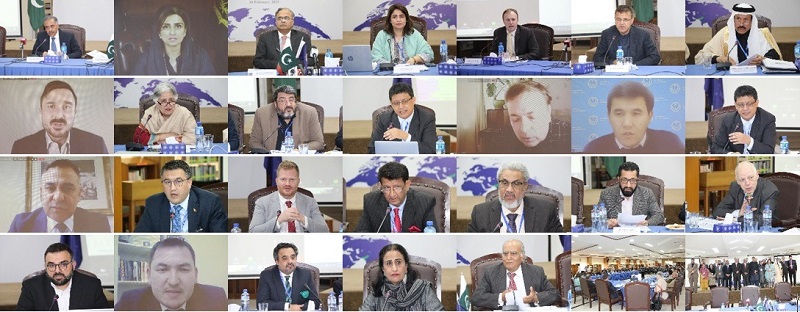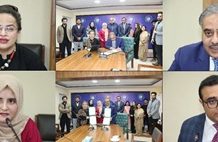Press Release
One Day CAMEA-ISSI-FES International Conference
“Pakistan’s Strategic Frontiers: Adapting to Evolving Global Trends”

The Centre for Afghanistan, Middle East and Africa (CAMEA) at the Institute of Strategic Studies (ISSI), in collaboration with the Friedrich Ebert Stiftung (FES), hosted a one-day international conference on “Pakistan’s Strategic Frontiers: Adapting to Evolving Global Trends.” Minister of State for Foreign Affairs, Ms. Hina Rabbani Khan, Foreign Secretary of Pakistan, Dr. Asad Majeed Khan, Director General ISSI, Ambassador Sohail Mahmood, Ms. Amina Khan, Director CAMEA and Dr. Niels Hegewisch, Country Director FES spoke in the inaugural session. The conference was divided into three working sessions: Evolving Dynamics in Afghanistan; Evolving Situation in the Middle East; and Emerging Non-Traditional Security Threats in Afghanistan, Central Asia & the Middle East.
Minister of State Hina Rabbani Khar, in her keynote video address, stated that Pakistan, owing to its geographical location, is placed it at the center of evolving global power dynamics and increasingly complex interplay between traditional and nontraditional foreign policy actors. She went on to say that globalization, interdependencies of economies and challenges of climate change and public health, water, energy and food security are compelling factors for win-win approaches. Geopolitics continues to influence interstate relations. She added that manipulation of interdependencies for geopolitics runs against the spirit of win-win cooperation that has been the hallmark of globalization for the last many decades and it is against the backdrop of these parallel global trends that Pakistan today has to define its interest.
Foreign Secretary Dr. Asad Majeed Khan, in his keynote address, said that the global transformations necessitate newer approaches for Pakistan. In the contemporary international politics, economic interdependencies, investment, trade, energy, connectivity are shapers and drivers of interstate relations. He went on to say that, in parallel, we are witnessing new geopolitical contestations, competition for influence, resources and dominance in the domain of technology. Pakistan has to navigate similar competing trends and Pakistan’s location also keeps it at the flashpoint of conflict. He also highlighted Pakistan’s geo-economic pursuits and stated that CPEC is an opportunity redefining regional connectivity. Polarization and power projection have only brought catastrophe and the world needs cooperation, and not confrontation. Furthermore, he said that Pakistan is committed to good relations with its neighbours.
DG ISSI Ambassador Sohail Mahmood highlighted the flux and uncertainty in the global environment. Specifically, he pointed to intensifying great-power competition, differences and disputes escalating into conflict and wars, food and fuel crises engulfing states big and small, a global pandemic manifesting itself in different variants, and a looming existential threat to mankind in the shape of climate change.
Ambassador Sohail Mahmood underlined that a global order marked by cooperative multilateralism, commitment to UN Charter principles and international law, and strengthening of instruments for collaborative action was essential.
In the context of Pakistan, he stated that after long and hard reflection, it had come to the view that comprehensive security – that puts a premium above all on human security – was the paradigm that it must follow. It encompasses everything from food and health security to climate resilience and water security to population and migration as well as gender security. “In essence, in the face of emerging global trends as well as all challenges and opportunities, Pakistan’s task is clearly cut out: i.e., to manage the complicated geo-politics and accentuate the pivot to geo-economics,” he concluded.
Ms. Amina Khan, said that while these evolving global trends pose challenges at the same time and more importantly, they offer an array of opportunities, both economic and political, for Pakistan as well as the world at large. However, this will depend on how Pakistan takes charge and shapes its own future amidst these various scenarios.
Dr. Niels Hegewisch from FES stated that dialogue is the best way to achieve lasting peace. The world since 2021 has witnessed fundamental and unprecedented changes and is still changing rapidly and countries need to adapt. He raised caution that there is no isolated place which is not affected by the decisions taken by countries miles away.
The First Session titled, “The Evolving Dynamics in Afghanistan,” was moderated by Ms. Amina Khan, Director CAMEA and the speakers included Dr. Omar Zakhilwal, Former Afghan Finance Minister; Mr. Graeme Smith, Senior Consultant on Afghanistan at the Crisis Group; Mr. Haiyun Ma, Associate Professor Frostburg State University, Maryland; Dr. Alexander Kornilov, Professor at Lobachevsky State University; and Mr. Rustum Khuramov, Head of Department at the ISRS Uzbekistan. Speakers were of the view that drastic cuts in international aid to Afghanistan will have adverse effects and this is a very important issue which must be addressed by the international community. All agreed that the Interim Government must make fast on its commitments, which include inclusive governance, ensuring the rights of women and minorities, and effective counter terrorism action, for a peaceful future of the country.
The second session titled, “Evolving Situation in the Middle East” was moderated by Ambassador Riffat Masood, Pakistan’s former Ambassador to Iran. Speakers of the session included, Dr. Ambassador Ali Awad Asseri, Rasanah Board Member and Former Ambassador of KSA to Pakistan; Dr. Foad Izadi, Faculty of World Studies, University of Tehran, Iran; Dr. Murat Aslan, Senior Researcher SETA Foundation for Political, Economic and Social Research, Turkiye; Dr. Flavius Caba Maria, President and Director of the Political Department, Middle East Political and Economic Institute (MEPEI), Romania; and Mr. Adam Weinstein, Research Fellow at the Quincy Institute, Washington, DC, US. Speakers said that the consequences of the Arab Spring have been serious and can still be seen in the form of dire humanitarian situations which continues in Yemen, Syria and Lebanon. The increasing relationship of the Gulf countries with China is motivated by economic needs, which are spurred by Saudi Vision 2030 and other such national rejuvenation plans in the Gulf region. The movement of the global order towards a multi-polar world, portends many opportunities for Pakistan. They agreed that many states in the region continue to suffer from fragmentation, political weaknesses, together with problems of legitimacy, social and economic security and war. On the role of the US, it was stated that the current administration is more focused on creating economic ties and partnerships.
The Third session titled, “Emerging Non-Traditional Security Threats in Afghanistan, Central Asia and the Middle East” was moderated by Dr. Ishtiaq Ahmed, Member, Development Communications, Planning Commission of Pakistan, Government of Pakistan. Speakers of the session included, Dr. Daud Abdullah, Director, Middle East Monitor (UK); Mr. Tameem Bahiss, Independent Analyst specializing in Afghan and Pakistani affairs, Dr. Christian Wagner, Asia Senior Fellow, Stiftung Wissenschaft und Politik, (SWP) Germany; Dr. Amin Mohseni-Cheraghlou, Assistant Professor of Economics at the American University in Washington, DC; and Dr. Almas Tussipzhanov, Senior expert of the Public Foundation “Center for Analysis and Forecasting “Open World”, Kazakhstan. Speakers stated that having a difficult neighborhood will be a challenge for Pakistan to focus on its non-traditional security issues. There is a lot of unemployment across the Asian region including Pakistan. Population can be double-edged sword. If managed effectively, there are opportunities also that states have to explore by themselves. Inter-state agreement is necessary to resolve these issues and there is a dire need for steps to reduce tensions among states.
The concluding session was moderated by Mr. Hamayoun Khan, Programme Advisor, FES Pakistan, who was of the view that the conference was very timely and covered a wide array of countries that were pivotal to Pakistan. Ambassador Naela Chohan said that the conference had a very well thought-out agenda, examining the various influences on Pakistan’s strategic frontiers and challenges, while adapting itself to evolving global trends where the search for security, stability and progress continues to be hampered by conflict, war, transnational terrorism, economic crisis, growing poverty, population growth and the disastrous impact of climate change.
In his concluding remarks, Chairman of ISSI BoG, Ambassador Khalid Mahmood appreciated the organizers for taking this timely initiative on a very important subject which would undoubtedly aid the Pakistani policymakers.











